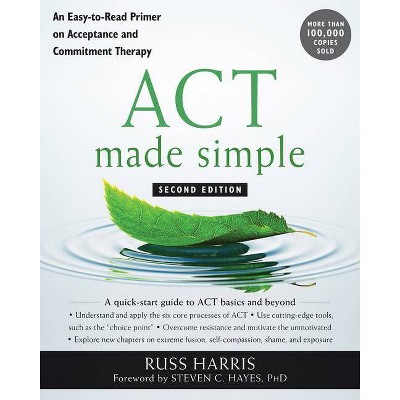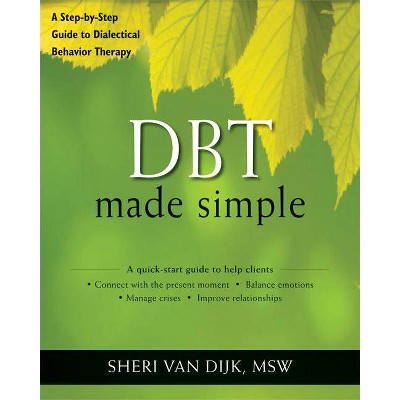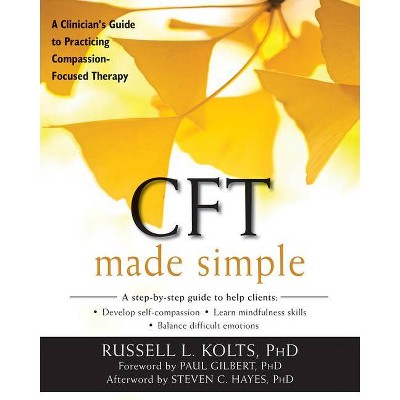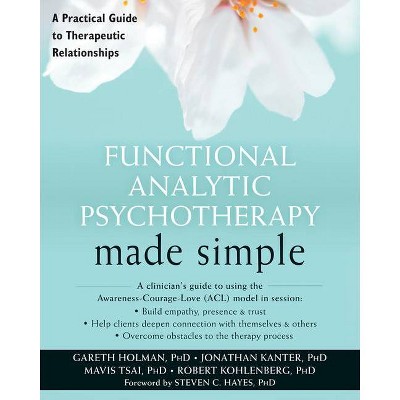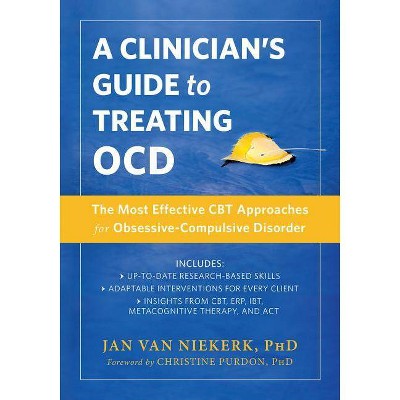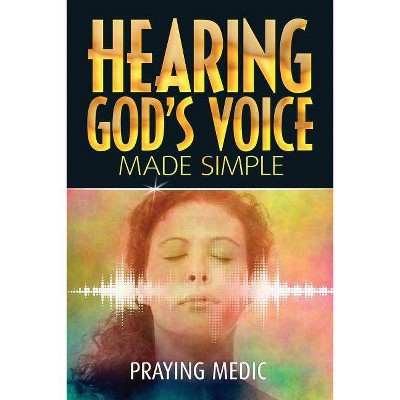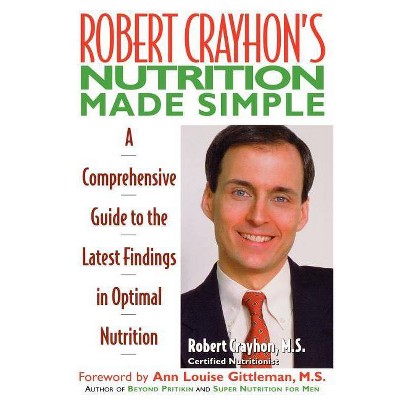CBT Made Simple - (New Harbinger Made Simple) 2nd Edition by Nina Josefowitz & David Myran (Paperback)
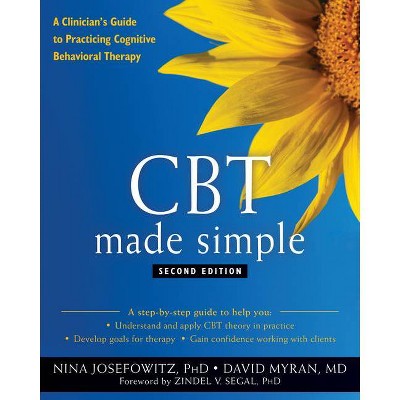
Similar Products
Products of same category from the store
AllProduct info
<p/><br></br><p><b> About the Book </b></p></br></br>Cognitive behavioral therapy (CBT) is a powerful and evidence-based treatment for several mental health disorders. However, there are no simple learning guides covering CBT: what it is, how it works, and how to implement it in session. In <i>CBT Made Simple</i>, two psychologists and experts in CBT offer mental health professionals <i>the</i> ultimate "how-to" guide. This fully revised and updated second edition includes the core components of CBT--core beliefs, intermediate beliefs, and behavioral experiments--to make this the most comprehensive and practical CBT manual available.<p/><br></br><p><b> Book Synopsis </b></p></br></br><p><b>In this second edition of <i>CBT Made Simple</i>, two renowned psychologists and experts in cognitive behavioral therapy (CBT) offer <i>the </i>most comprehensive manual available to help professionals learn CBT and deliver it to clients for better treatment outcomes.</b></p><p>CBT is an evidence-based treatment for several mental health disorders, including anxiety, depression, obsessive-compulsive disorder (OCD), post-traumatic stress disorder (PTSD), and anger problems. This simple, pragmatic guide offers everything you need to know about CBT: what it is, how it works, and how to implement it in session.</p><p>This fully revised and updated second edition of <i>CBT Made Simple </i>provides a user-friendly, practical approach to learning CBT using up-to-the-minute teaching methods and learning tools--in particular, the "effective adult learning model," which promotes interactive learning, experiential learning, and self-reflection. Each chapter presents key elements of CBT in clear, accessible language, and includes client dialogues and clinical examples. Practical exercises are incorporated throughout, enabling you to practice and consolidate your learning. In addition, each chapter mimics the structure of an actual CBT session.</p><p>This new edition also includes the core components of CBT--core beliefs, intermediate beliefs, and behavioral experiments--to make this the most comprehensive CBT manual you'll find anywhere.</p><p>If you are a clinician or student interested in learning more about CBT, this book--part of the New Harbinger <i>Made Simple</i> series that includes <i>ACT Made Simple</i> and <i>DBT Made Simple</i>--has everything you need to hit the ground running. Why not make it a part of your professional library?</p><p/><br></br><p><b> Review Quotes </b></p></br></br><br>"<i>CBT Made Simple</i> offers an innovative, cutting-edge method of understanding and using CBT using the effective adult learning model. This unique and practical resource will be of great help to clinicians who are new to CBT, as well as those who've been practicing for years. I highly recommend this book!" <br><b>--Matthew McKay, PhD</b>, psychologist; and coauthor of several books, including <i>The CBT Anxiety Solution Workbook</i>, <i>Thoughts and Feelings</i>, and<i> Self-Esteem</i>--Matthew McKay, PhD<br><br>"<i>CBT Made Simple</i> delivers a thorough, clear, and structured approach to learning cognitive behavioral therapy (CBT) skills and applying them to clinical practice. Seasoned and new therapists will benefit from the written exercises, discussion of which interventions to use, and additional online resources to augment their learning. I'm thrilled with the addition of mindfulness concepts in the second edition, which I've found add depth and efficacy to my own CBT practice." <br> --<b>Sharon Martin, MSW, LCSW</b>, psychotherapist, and author of <i>The CBT Workbook for Perfectionism</i>--Sharon Martin, MSW, LCSW<br><br>"CBT is arguably the most important nonmedical advancement in modern psychiatry. It has moved psychotherapy out of the Dark Ages to become a science-based approach that has alleviated the suffering of countless of people inflicted by debilitating mental disorders. Still, very few clinicians today practice good (or any type of) CBT, regardless of what they claim. This clinician's guide for CBT by Josefowitz and Myran should be essential reading for any practicing clinician. I highly recommend this book." <br><b>--Stefan G. Hofmann, PhD</b>, professor of psychology in the department of psychological and brain sciences at Boston University--Stefan G. Hofmann, PhD<br><br>"Josefowitz and Myran have written a tremendously useful and practical book for new and seasoned practitioners alike. <i>CBT Made Simple</i> is accessible, engaging, and provides a wealth of clinical examples, resources, and applications that will be turned to time and time again. The authors' experience and wisdom shines through in providing guidance to help the reader apply CBT not only to their clients, but to learn through applications on themselves. Each chapter follows the structure of a CBT session, and guides the reader through learning in the same way that they will teach their clients. CBT is made simple through this elegantly written book!" <br><b>--Deborah Dobson, PhD, RPsych</b>, adjunct professor in the department of psychology at the University of Calgary, and coauthor of <i>Evidence-Based Practice of Cognitive-Behavioral Therapy</i>; and<b> Keith Dobson, PhD, RPsych</b>, professor of clinical psychology at the University of Calgary, and coeditor of <i>Handbook of Cognitive-Behavioral Therapies</i>--Deborah Dobson, PhD, RPsych & Keith Dobson, PhD, RPsych<br><br>"Much has been written on CBT. Still there is a need--indeed a hunger--for a clear and practical how-to book. This volume fills that need remarkably well. Its pragmatic, skill-based, experiential approach will be extremely helpful--especially for clinicians new to CBT for whom it is intended. However, clinicians with all levels of sophistication and experience will find much to deepen their knowledge and practice." <br> --<b>Michael Rosenbluth, MD, FRCPC</b>, chief of the department of psychiatry at Toronto East General Hospital, and associate professor at the University of Toronto--Michael Rosenbluth, MD, FRCPC<br><br>"The second edition of <i>CBT Made Simple</i> by Josefowitz and Myran is an updated version of their outstanding guide to the practice of CBT. This book is a rare example of a step-by-step manual that is user-friendly, case-based, engaging, and filled with useful tools and resources, including videos that can be accessed online. The new edition has some excellent additions, including how mindfulness approaches can be used to complement CBT." <br><b>--David K. Conn, MB, FRCPC</b>, vice president of education at Baycrest Health Sciences, and professor in the department of psychiatry at the University of Toronto--David K. Conn, MB, FRCPC<br><br>"The second edition of this extremely practical, helpful, and essential book on CBT is now even better than its prior iteration. In a careful, emphatic, and clear manner, the reader is escorted through key principles. Especially exciting are new chapters on recognizing and dealing with old, long-standing core beliefs and how to replace them, as well as dealing with underlying assumptions and behavioral experiments. Also, throughout the book there are now sections on how to incorporate mindfulness into CBT, helping clients decenter from their painful and habitual thoughts. Clinicians with all levels of sophistication and experience will find much to deepen their knowledge and practice. This volume is destined to be a classic." <br><b>--Michael Rosenbluth, MD, FRCPC</b>, chief of the department of psychiatry at Michael Garron Hospital, Toronto East Health Network; and associate professor at the University of Toronto--Michael Rosenbluth, MD, FRCPC<br><br>"This book provides a clear and structured approach to learning and practicing CBT. Nina and David have incorporated active learning strategies, visual and auditory techniques, and lots of opportunities to practice new skills. In addition, a wealth of resources is available online to supplement the text. This book is an invaluable resource for therapists learning CBT for the first time, and for those more experienced who need a refresher in the core principles and practices of CBT." <br><b>--Enid Grant, MSW, RSW</b>, senior director of children's mental health at Skylark Children, Youth & Families--Enid Grant, MSW, RSW<br><br>"This is a program hidden in a book, which encourages an experiential approach to CBT learning. With the additional web resources (videos, handouts) it will thoroughly engage CBT learners and teachers. A 'must-have' text in the era of expanding CBT practice." <br><b>--Sanjay Rao, MD</b>, clinical director of the mood and anxiety program at Royal Ottawa Mental Health Centre, associate professor of psychiatry at the University of Ottawa, and executive member of the Canadian Association of Cognitive Behavioural Therapies--Sanjay Rao, MD<br><br>"This second edition of <i>CBT Made Simple</i> retains all of what made the first edition such a great resource, and adds new material on working with core beliefs, mindfulness-based strategies, and case formulation. As in the first edition, each chapter in this well-written book models the structure of a typical CBT session, including setting an agenda and completing practical exercises to build skills. I highly recommend this updated edition of <i>CBT Made Simple</i>, both for new clinicians and experienced therapists wanting to hone their CBT skills!" <br><b>--Martin M. Antony, PhD</b>, professor of psychology at Ryerson University, and coauthor of <i>The </i><i>Shyness and Social Anxiety Workbook </i>and<i> The Anti-Anxiety Program</i>--Martin M. Antony, PhD, ABPP<br><p/><br></br><p><b> About the Author </b></p></br></br><b>Nina Josefowitz, PhD</b><b>, </b> is a psychologist and an acclaimed teacher known for her interactive, experiential approach. She has taught cognitive behavioral therapy (CBT) to mental health workers throughout the world, including psychiatrists and psychiatric residents in Ethiopia, psychologists in China, and graduate students in India. She has given workshops on CBT to social workers, nurses, occupational therapists, counselors, psychologists, and students in North America. For more than twenty years, she has taught CBT to graduate students in the department of applied psychology and human development at the Ontario Institute for Studies in Education (OISE) of the University of Toronto. She has published in the areas of trauma, women's issues, ethics, the therapeutic relationship, and a variety of issues related to CBT. Her most recent interests include adapting CBT to diverse populations and developing experiential teaching methods. <p/><b>David Myran, MD</b><b>, </b><b>FRCPC</b>, (1949 - 2016) was a geriatric psychiatrist, and assistant professor in the department of psychiatry at the University of Toronto. For many years, he was director of the Geriatric Psychiatry Outreach Team at Baycrest Health Sciences--a University of Toronto-affiliated hospital, where he served as a staff psychiatrist. Myran was also a CBT supervisor for psychiatry residents at the University of Toronto. He published and presented at professional conferences on a wide number of topics, including psychological treatment for irritable bowel syndrome, a range of topics within geriatric psychiatry, the therapeutic relationship, and depression. His interests also included using telehealth to provide psychiatric services to older adults who are housebound. <p/> Foreword writer<b> Zindel V. Segal, PhD</b>, is professor of psychology at the University of Toronto Scarborough. He is coauthor of <i>Mindfulness-Based Cognitive Therapy for Depression</i> and <i>The Mindful Way through Depression</i>.
Price History
Price Archive shows prices from various stores, lets you see history and find the cheapest. There is no actual sale on the website. For all support, inquiry and suggestion messagescommunication@pricearchive.us
